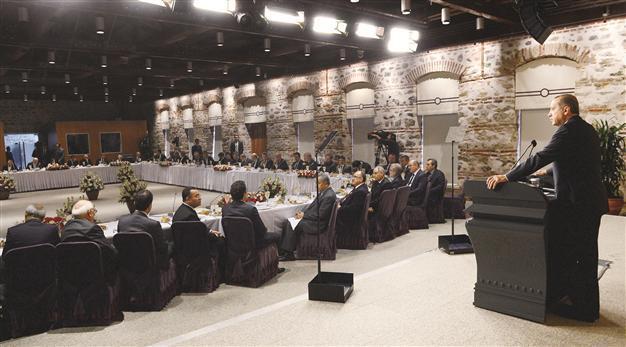Islamic Scholar Gülen’s letter to Ankara intensifies graft case row
ISTANBUL

‘What they wanted to do was an attempted assassination of the national will,’ PM Erdoğan tells the journalists at a meeting where he reiterated that his government is under attack by a group backed from abroad. AA photo
The revelation that a letter was recently sent by Islamic scholar Fethullah Gülen to President Abdullah Gül has not eased the bitter ongoing rift between the Gülen movement and the Turkish government.The existence of the letter was made public after Prime Minister Recep Tayyip Erdoğan held a meeting with the with NGO representatives, columnists and journalists mostly close to the government at a luncheon in Istanbul on Jan. 4. During the meeting, Erdoğan mentioned a letter sent from Gülen, and a number of the journalists present described this as a “peace letter” sent by Gülen.
However, the Gülen-affiliated Journalists and Writers Foundation (GYV) issued a statement on Jan. 4, denying that the letter was sent to the prime minister as reported by some, adding that it was instead a response to a guest who visited Gülen on behalf of a “significant statement.”
“The letter was not addressed to the prime minister and it does not include any sort of ‘bargaining,’” the GYV statement said, refuting claims that Gülen was seeking to “bargain” with Erdoğan.
Late yesterday, the content of the letter was revealed by herkul.org, a website that releases the public remarks of Gülen. Herkul.org accompanied the letter with a note stating that it was written upon a request from President Gül. Gülen agreed to write his response and also told the guest that he wanted the prime minister to be informed of the letter’s content.
The Pennsylvania-based imam expressed his sadness that his movement’s members were being targeted and hampered in their career due to the ongoing controversy, the website’s notes added, citing the letter. Gülen also said it was unfortunate that a number of public workers who had no ties to the recent corruption investigations were also being removed from their posts.
He also denied claims that he had influenced state activities, including giving orders or directives to civil servants, in an apparent response to Erdoğan’s claims that a “parallel state” was plotting against his government by organizing the graft probes.
In the letter, Gülen stressed that what was happening to members of his movement would happen to the other communities, such as those of the followers of Mahmut Hüdai, the Süleymanites, and the Spread of Science Society (İlim Yayma Cemiyeti).
However, during his speech at the beginning of his meeting with journalists on Jan. 4, Prime Minister Erdoğan did not appear to change his stance on the ongoing investigation, reiterating his view that shadowy groups in Turkey and abroad were conspiring to oust him from power.
“What they wanted to do was an attempted assassination of the national will,” he said.
“They tried to carry out a judicial coup in Turkey ... But we are going to oppose this operation, this Dec. 17 plot that targeted the future and the stability of our country,” Erdoğan added, referring to the to the vast corruption investigation that started on Dec. 17 and led to the arrests of key allies, including high-profile businessmen and the sons of former ministers.
Five lawmakers have so far resigned from the ruling Justice and Development Party (AKP) due to the scandal.
Erdoğan also expressed confidence that Turkey would “overcome its current difficulties,” pointing to the coming municipal elections set for March as a test for his regime, and to the upcoming presidential elections in August. “We will not allow a cloud to be cast over Turkey’s future,” he said.
















